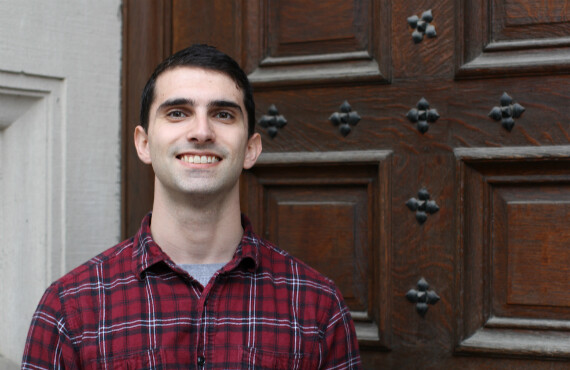A Passion for Research Takes Penn Senior Beyond the Stacks
By Christina Cook
University of Pennsylvania senior Nick DeFina has spent his last four years engaged with the various intricacies, insights and intrigues of scholarly research. He has pursued this passion on campus and off, through curricular and co-curricular projects, and through the lens of different disciplines: Research has been the one constant in his richly varied intellectual life at Penn’s School of Arts & Sciences.
DeFina, who is from Haverford, Pa., says the seeds of his passion were sown soon after arriving at Penn, in a course called Cultures of the Book. Peter Stallybrass, professor of English and of comparative literature and literary theory, convened the class in the Kislak Center for Special Collections, Rare Books and Manuscripts, where DeFina and his classmates could work directly with items in its world-renowned holdings.
Says DeFina, “Professor Stallybrass would say over and over again that Penn is really special in that it does not pretend that this kind of work is somehow out of the reaches of undergraduates just because they don’t know as much about it as a graduate student would, per se. It’s not about what you know; it’s about what you need to know in order to solve your problem and move forward.”
By the time his first semester drew to a close, DeFina was hooked. He soon secured a job at Kislak, working at the front desk and assisting researchers. Now, nearly four years later, DeFina’s supervisor and Reading Room public service specialist John Pollack commends DeFina as “a devoted 'team member' [whose] intellectual curiosity, language interests and wonderful temperament have endeared him to all of us.”
This year, DeFina took on the role of assisting Laura Aydelotte, CLIR postdoctoral fellow and director of the Provenance Online Project, or POP. POP is a digital project at Kislak that DeFina describes as “a way of networking provenance research via the internet.”
“The project involves uploading high-resolution images of rare materials that have notable provenance markings,” he says, “things that might give us a good sense of who might have written it or owned it or might tell us something about the printer.”
DeFina then helps make those images public so librarians, scholars, students and bibliophiles around the world can contribute information—a collective effort that not only generates records of ownership for individual books but also advances research in the fields of book history and material culture.
Aydelotte says that his contributions to the projects go well beyond the academic.
"Nick’s intelligence, attention to detail, and ability to take on an impressive range of tasks while maintaining a calm, friendly and productive attitude toward everyone around him, have made it a great pleasure to have him on the project.”
DeFina continued to find his work with rare materials highly relevant even after changing his major from English to philosophy, because it provided him with basic skills that he says any scholarly researcher needs to have. And his philosophical leanings offer a unique lens through which to see the process of research and the knowledge it yields:
“Research is about figuring out what’s behind a source material and how to access that hidden information,” he says, “not just in what was written but also how it was written and what identifying marks the source material might have.”
The second co-curricular project DeFina’s been working on this year involves the creation of a database that helps researchers mine this hidden information more easily. At the University Archives and Records Center, he is assisting senior archivist Jim Duffin develop a searchable index of key terms that can be used to find data extracted from handwritten minutes recorded during meetings of Penn's Board of Trustees.
Mark Frazier Lloyd says the Trustee Minutes Database project is an important part of the University Archives’ long range goal to digitize this compendium, “not only for the documentation of Penn’s institutional history, but also for the research and study of American higher education in general.”
DeFina is currently working on records from the 1830s and will spend the summer digitizing records from the 1840s and 50s. Sometime between the establishment of Penn’s first organized sport (cricket, 1842) and the founding of Penn Law (1850), however, DeFina will take a few days off to graduate.
And with that graduation fast approaching, DeFina reflects back on his decision to attend Penn rather than one of the small liberal arts colleges he was initially considering. “I think Penn has more to offer students interested in the humanities because of all the other avenues it enables you to explore. There are lots of communities within Penn’s broader community that create that same kind of welcoming atmosphere. The Kelly Writers House, which recruited me to come here, is one example. A lot of performing arts groups at Penn are also very close-knit. Students craft their own communities here and it’s a really cool thing.”
DeFina describes his involvement with Kislak and the University Archives as “separate from my social group on the weekends and other groups I belong to. I think that these diverse experiences are essential to having a good education and becoming a more well-rounded person.”








